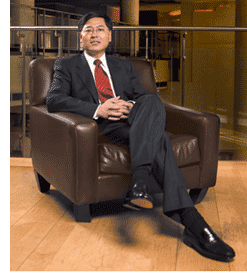Yuanqing Yang, Chairman / Lenovo

But Yang (his surname), chairman of Lenovo, which late last year stunned the industry by announcing its $1.75 billion acquisition of IBM&'s Personal Computing Division, has spent much of 2005 teaching those observers Chinese or at least the power that the Chinese may bring to bear on the IT industry.
Almost overnight, Lenovo went from being king of China's PC market to the No. 3 PC vendor worldwide and, in the process, turned its 41-year-old chairman into the representative of just how important China has become to the channel.

In 1989, Yang became a salesman for The Legend Group, founded in 1984 by the Chinese Academy of Sciences. A mere 12 years later, at the age of 37, he moved to the top as president and CEO. The company changed its name to Lenovo in 2003 and last year named Yang chairman as it unveiled the deal to acquire the IBM PC division.
His quick rise has not given Yang the opportunity to develop the kind of stage presence expected of top executives. In his few public appearances in the United States this year, Yang, in his formal black business suit, still appeared unsure of himself in front of an English-speaking audience. Yang answered questions in English only after they were first translated for him in Chinese and declined one-on-one interviews with the media.
Regardless of his level of English, Yang has certainly grasped the meaning—and importance—of the word channel.
While Lenovo could have kept its roots in Beijing, Yang moved his executive offices to New York, where he spends much of his time working with Steve Ward, the former IBM executive who is now Lenovo&'s CEO. And solution providers say he has given his new channel team a renewed sense of purpose.
Under IBM, the channel group seemed concerned about the future because of the company&'s diminished focus on PCs, says Bill Nemesi, brand manager at Mainline Information Systems, an IBM business partner in Tallahassee, Fla. “Now they see they have a future. I live in Raleigh, [N.C.], where a lot of Lenovo employees work. And they seem very positive.”
Yang certainly has had no lack of advice on the importance of the channel, including from one of his top competitors.
J.T. Wang, chairman and CEO of Acer, met Yang early this year at a conference in Beijing and says Yang admitted he studied Acer&'s business model, including how aggressively the company is building its channel. “He said, ‘Maybe I would like to learn from you,&' ” Wang says. “And I said, ‘OK, if you have any questions, I will be happy to answer.&' Maybe that&'s just because of politeness. But I told him I feel the channel business still has some room for the new Lenovo to join.”
Wang says he welcomes Yang and Lenovo into the U.S. channel with Acer. “We consider that if they become more aggressive in the channel, it&'s a good thing for us because we are kind of lonely in the United States.”
Time will tell if Yang can resist the call of the direct model better than his U.S. peers. But for now, the word Lenovo is looking like Chinese for channel.
EDWARD F. MOLTZEN contributed to this story.